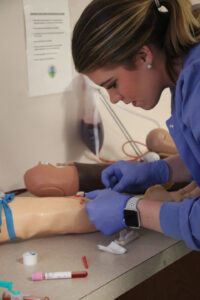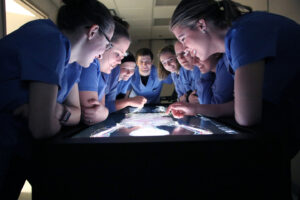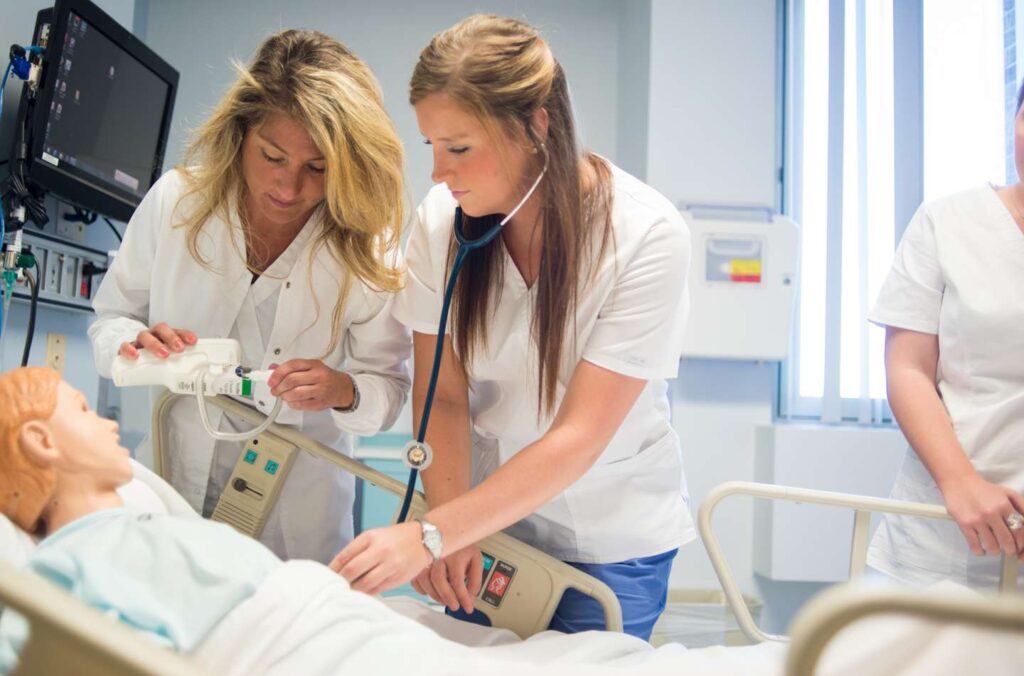
There have been numerous organizations that have projected an increased demand for nurses over the next decade. There are several paths that an individual can take to become a registered nurse. A person could start as a patient care technician, advance to licensed practical nursing, then to an associate degree nurse, and finally complete another two years of course work to receive a Bachelor of Science in Nursing. Another option is to complete anatomy and physiology as dual college credit in high school and apply for a direct admit into the three-year fast track BSN at Saint Mary-of-the-Woods College. Accepted students start directly into nursing courses and are required to attend classes during two summer sessions in order to meet the degree requirements.
Students often ask, “What is the advantage of the BSN?” The answer is the expectations of being a professional nurse versus a technical nurse. Now, do not misunderstand. All nurses need great clinical skills. With a professional degree the expectations are that the nurse is actively involved in the prevention, health promotion, patient access, quality improvement and leadership. The BSN nurse has the duty to make health care better. This is accomplished through the use of evidence-based practice and innovation.
During your education at SMWC, the faculty helps students be successful through structure and support. Students receive individualized attention and every faculty member knows your name, your strengths, and your struggles. The small clinical groups allow ample time for hands-on skill development and clinical reasoning. Direct patient care, state-of-the-art simulations, and the development of best practice application assignments prepare you for your future role as a professional nurse.

The BSN graduate has a broad base of science and the humanities to foster critical thinking and problem-solving. These nurses are guided by values gained in philosophy and ethics. They have the durable skills of effective verbal and written communication, as well as teaching skills to explain important information to patients and families. They can negotiate and resolve conflicts and they possess a persuasive ability to advocate for others. The faculty believes that by creating an environment of caring, integrity and intellectual growth, students can become their very best self, and will maintain a desire for life-long learning.
Health care needs executives, educators and researchers. The BSN is the pathway to graduate education and our students find the transition to graduate school a seamless process in which they are well-prepared. Selecting the best educational program that fits your needs is one of the most important decisions you will ever make. If you are undecided or unhappy in your current program, come visit SMWC. We also encourage you to talk to our students and graduates. Come experience the SMWC difference – where virtue and knowledge unite.
About the Author

Marcia Ann Miller, Ph.D., is the chair of the Department of Nursing at Saint Mary-of-the-Woods College. She earned a bachelor of science degree in nursing in 1974, and a master of arts in counseling psychology in 1976 from Ball State University. She completed a master’s degree in psychiatric nursing as a clinical nurse specialist from Saint Xavier University in Chicago in 1990. In 2004, she completed her doctorate degree from Indiana State University in higher education leadership.
Miller has held faculty positions at both the graduate and undergraduate levels. She has been a faculty member at Ball State University, Purdue University North Central and Indiana State University. She has also served as the coordinator of distance nursing education, executive director of nursing, and associate dean for academics and assessment in a college of health science.


0 Comments